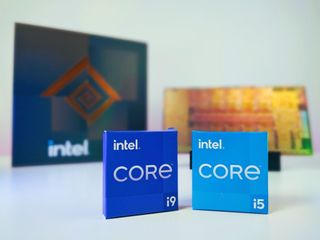Intel reveals 12th Gen Mobile PC chips with 14 cores, 20 threads and new hybrid architecture
Following its desktop chips, Intel today is detailing its new Core H, Core-P, and Core-U-series for new laptops this spring.

What you need to know
- Intel has announced new SKUs for its 12th Gen Mobile processors for laptops
- There are 28 new laptop processors built on the new performance hybrid architecture.
- The chips include 45W H-series, 28W P-series, and 15W U-series for gaming laptops to Ultrabooks.
- Intel also announced its third generation of the Intel Evo platform as well as foldable PCs coming later in 2022.

As expected (and following AMD), Intel has unveiled its 12th Generation of Core processors laptops spanning high-end gaming rigs and workstations to super think Ultrabooks to even PCs with foldable displays coming later this year.
Intel's 12th Gen Core Mobile processors follow its desktop chips announced a few months ago (see our review of the Core i9-12900K). While these chips are, of course, faster, it is the new performance hybrid architecture using dedicated Performance (P) and Efficient (E) cores that change the game.
The performance hybrid architecture is similar to ARM, where individual cores focus on the task at hand (P-cores) while E-cores, using substantially less power, handle background tasks. All of this is managed through Intel's Thread Director technology (a highly specialized hardware abstraction layer aka HAL) in conjunction with Windows 11.
Like previous generations, Intel breaks its mobile chips into three broad categories, including:
- H-series: For enthusiast laptops (gaming, workstations, high-end computing)
- P-series: For performance thin and light laptops
- U-series: For modern thin and light laptops
Let's break them down to see what's new.
Intel 12th Gen H-series: 14 cores, 20 threads, oh my

The big kahuna chips are Intel's H-series, which can be found in laptops focused on gaming, workstations, and anything that needs a lot of CPU power. With 12th Gen, however, everything is much more efficient and flexible. But it's the addition of so many cores and threads that will make the most significant impact.

The new flagship Core i9-12900HK is Intel's fastest chip for laptop PCs from now on. It can reach an impressive 5 GHz frequency and has 14 cores (6 P-cores and 8 E-cores) and 20 threads. AMD's latest Ryzen 6000 Mobile chips, by contrast, peak at just 16 threads and 8-cores.
Intel claims a real-world performance jump of up to 28% over 11th Gen Intel when it comes to gaming and up to 40% faster overall performance, which is a substantial improvement. Citing the game Hitman 3, Intel notes up to 8% higher frames-per-second (FPS).
The flagship Core i9-12900HK features a massive 14 cores and 20 threads, while hitting 5.0GHz.
For creators, Intel throws around some other numbers, including +44% in using Adobe Creative Cloud, +14% in Autodesk, 30%+ in Blender, and +22% in CrossMark Creativity Scenario, all compared to last-gens Core i9-11980HK.
In benchmark comparisons, it thoroughly trounces AMD's Ryzen 9 5900HX. However, we don't know how it compares to AMD's latest flagship, the Ryzen 9 6980HX, which also has a 45W+ TDP, but with fewer cores (8 vs. 14) and threads (16 vs. 20) than Intel.
On paper, the advantage goes to Intel.
Bumping up the rest of package DDR5-4800 and LPDDR5-5200 RAM is now a thing with up to 4,800 MT/s performance. There is also support for PCIe 4.0, which should be more common in 2022, Thunderbolt 4, Killer Wi-Fi 6E with Intel Double Connect.

In an exciting addition, for the first time, Intel's H-series chips can also gain Intel Evo Platform certification, which are laptops co-engineered with Intel to meet certain specifications. Evo focuses on "responsiveness, real world battery life, instant wake and fast charge," as well as the inclusion of Thunderbolt 4, Wi-Fi 6E, and now (strongly) recommended full HD webcams.
Of course, all the major OEMs are on board with the H-series, including Acer, Dell, Gigabyte, HP, Lenovo, MSI, Razer, and ASUS ROG, to name a few. Many of these brands are also co-announcing new laptops, primarily focused on gaming, at CES 2022, with planned consumer availability in early spring 2022.
Intel 12th Gen P-series: 14-cores and 20-threads in an Ultrabook? Yup.

Intel didn't go into too much depth about its P-series of chips, but it did list the SKUs for them. In addition, we know many new laptops will be available with the P-series in the coming months, with Dell's groundbreaking and jaw-droppingly gorgeous XPS 13 Plus taking the lead.
The P-series are classified for premium thin and light laptops where performance really matters. Previously, Intel had U-series chips that could clock higher, but that changes with P-series, which offer a substantial improvement over the last-gen.
On paper, Intel may have beaten AMD (at least for cores and threads).
The top-tier chip is the Core i7-1280P, which features a whopping 14-cores and 20-threads while peaking at 4.8GHz. It has a base power of 28 watts but can boost to 64 watts. That's an insane amount of power typically reserved for larger laptops, but it will be available in the ultra-svelte XPS 13 Plus, which is just 1.24kg (2.73 lbs.) and 15mm thick.
By comparison, AMD's new Ryzen 7 6800HS hit 4.7GHz and only has 8 cores and 16 threads with a TDP at 35 watts.
Of course, not all the chips feature such performance, but even the Core i5-1240P, which will be the mid-range option in premium "thin and light" Ultrabooks, packs 12 cores, 16 threads, and peaks at 4.4GHz. There are even updates to Pentium with the "8505," which has 5 cores and 6 threads (peaking at 4.4Ghz), and the super-budget Celeron, with the same core and thread count but runs at just 1.1GHz.

Look for Intel's 12th Gen P-series chips in premium Ultrabook designs from HP, Dell, Lenovo, and others in the coming months. Such a chip could even fit into a refreshed Microsoft Surface Laptop.
Intel 12th Gen U-series: Next-gen devices and foldables

Interestingly, the Intel 12th Gen U-series chips will be found in more affordable laptops and featured in next-generation designs.
Intel announced at CES its "Foldable Display Spec," which is a public branding of "Project Horseshoe Bend," a loosely knit group including Intel, Samsung, and Microsoft, working on establishing guidelines for PCs with foldable displays (similar to the Lenovo X1 Fold, though Lenovo is technically doing its own thing in this space).
The foldable display spec includes Intel Evo specs, fanless designs, 17-inch OLED foldable displays by Samsung, and are hitting the market this year from some of the top manufacturers.


Looking more closely at the U-series SKUs, there are ten options, not including Pentium and Celeron. There are actually five, but Intel doubles up since half are for enterprise (Windows 11 Pro) with Intel vPro and the other five are for consumer laptops (Windows 11 Home) without Intel vPro.
The Core i7-1265U packs 10-cores and 12 threads while hitting 4.8GHz.
The crown jewel chip is the Core i7-1265U, which is still no slouch packing a massive 10-cores and 12 threads while hitting 4.8GHz. Base power is 15 watts but can peak or be configured to hit 55 watts by OEMs. The Core i5 chips are also 10 core/12 threads, with only the Core i3 dropping to 6 cores and 8 threads.
Considering all previous Intel mobile U-series processors peaked at 4 cores and 8 threads, this is an impressive development.
AMD's answer to the Core i7-1265U is the new Ryzen 7 6800U. These are a little tougher to compare as Intel has 10 cores (versus AMD's 8), while AMD leads with 16 threads (versus just 12 with Intel). Intel is slightly faster at 4.8Ghz instead of AMD's 4.7GHz.
Besides next-gen foldable PCs, look for the U-series in your standard mid to upper-range thin and light laptops.
Wrapping up: Intel is looking strong for 2022
While Intel still dominates the premium thin and light laptop space, it has been ceding ground to AMD in gaming due to the latter's better performance and efficiency. That seems to be going out the door now with Intel's 12th Gen series, which changes up the entire chip design to balance performance and efficiency by divvying up the workload.
Intel still gets some extra perks with its Evo Platform, exclusivity to Thunderbolt 4 (AMD is now using USB 4.0 as an alternative), and existing relationships with OEM partners. That said, in a continuing trend, expect to see those same PC makers diversify more with AMD designs this year, including so-called "A&A" laptops where AMD is used in the CPU and GPU for unmatched efficacy.
We'll have to wait to benchmark and evaluate battery life with Intel's latest 12th Gen chips, but if they are anything like its latest desktop chips, there is a lot to be excited about in 2022.
Get the Windows Central Newsletter
All the latest news, reviews, and guides for Windows and Xbox diehards.

Daniel Rubino is the Editor-in-chief of Windows Central, head reviewer, podcast co-host, and analyst. He has been covering Microsoft since 2007 when this site was called WMExperts (and later Windows Phone Central). His interests include Windows, laptops, next-gen computing, and for some reason, watches. Before all this tech stuff, he worked on a Ph.D. in linguistics, watched people sleep (for medical purposes!), and ran the projectors at movie theaters because it was fun.